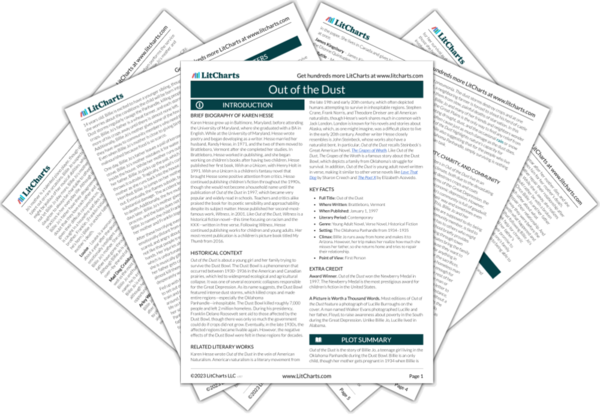Out of the Dust follows 14-year-old Billie Jo as she and her parents struggle to survive in mid-1930s Oklahoma, during the height of the Dust Bowl. The Dust Bowl was a phenomenon that temporarily destroyed American agriculture in parts of Colorado, Kansas, Texas, New Mexico, Nebraska, and Oklahoma during the 1930s. From 1930-1936, millions of Americans suffered, none more so than those who lived in the Oklahoma Panhandle, like Billie Jo and her family. The novel presents the Dust Bowl as something that rules people’s lives, and it frames the natural world more broadly as a malevolent force that’s impossible for people to either control or predict.
Billie Jo often describes the various coping mechanisms that she and her family use to survive the constant dust, from keeping a wet cloth over her nose and mouth to only turning over plates on the dinner table immediately prior to eating. These habits highlight how fundamentally the constant dust changed people’s lives and forced them to adapt. At various points throughout the novel, dust storms sweep through town, killing people during the storm itself—while later, victims die of dust pneumonia. The dust storms destroy crops and at one point, a neighboring farmer is forced to shoot his herd of cattle to save them from slow, painful deaths of starvation. In this context, Billie Jo and many of her friends and neighbors wonder if leaving the Great Plains is the only way to find any relief from the unrelenting drought, dust, and the occasional rain or snow storms that often cause just as much damage as the dust does. With this, Out of the Dust highlights nature’s capacity for destruction, while also suggesting that for the people who live in the 1930s Oklahoma Panhandle, simply surviving is nothing short of a herculean task.
Nature, Survival, and the Dust Bowl ThemeTracker

Nature, Survival, and the Dust Bowl Quotes in Out of the Dust
Now Livie’s gone west,
out of the dust
on her way to California
where the wind takes a rest sometimes.
And I’m wondering what kind of friend I am,
wanting my feet on that road to another place,
instead of Livie’s.

Unlock explanations and citation info for this and every other Out of the Dust quote.
Plus so much more...
Get LitCharts A+I ask Ma
how,
after all this time
Daddy still believes in rain.
He ran into the storm,
his overalls half-hooked over his union suit.
“Daddy!” I called. “You can’t stop dust.”
But Ma says, “Can’t you see
what’s happening, Bayard?
The wheat’s not meant to be here.”
And Daddy says,
“What about those apple trees of yours, Pol?
You think they are?
Nothing needs more to drink than those two.
But you wouldn’t hear of leveling your apples,
would you?
I looked at Ma
so pregnant with one baby.
“Can you imagine five?” I said.
Ma lowered herself into a chair.
Tears dropping on her tight stretched belly,
she wept
just to think of it.
But the grasshoppers ate every leaf,
they ate every piece of fruit.
Nothing left but a couple apple cores,
hanging from Ma’s trees.
I couldn’t tell her,
couldn’t bring myself to say
her apples were gone.
I never had a chance.
Ma died that day
giving birth to my brother.
My father will stay, no matter what,
he’s stubborn as sod.
He and the land have a hold on each other.
But what about me?
I think about Ma
and how that birth went.
I keep the kids out and listen behind me,
praying for the sound of a baby
crying into this world,
and not the silence
my brother brought with him.
And the cry comes
and I have to go away for a little while
and just walk off the feelings.
My father has a raised spot
on the side of his nose
that never was there before
and won't go away.
And there’s another on his cheek and two more on his neck,
and I wonder
why the heck is he fooling around.
He knows what it is.
His father had those spots too.
No one talks about fire
right to my face.
They can’t forget how fire changed my life.
But I hear them talking anyway.
Don’t forget us, they say.
But there are so many leaving,
how can I remember them all?
Mad Dog scooped a handful of dust,
like a boy in a sandpit.
He said, “I love this land,
no matter what.”
I looked at his hands.
They were scarless.
I thought maybe if my father ever went to Doc Rice
to do something about the spots on his skin,
Doc could check my hand too,
tell me what to do about them.
But my father isn’t going to Doc Rice,
and now
I think we’re both turning to dust.











